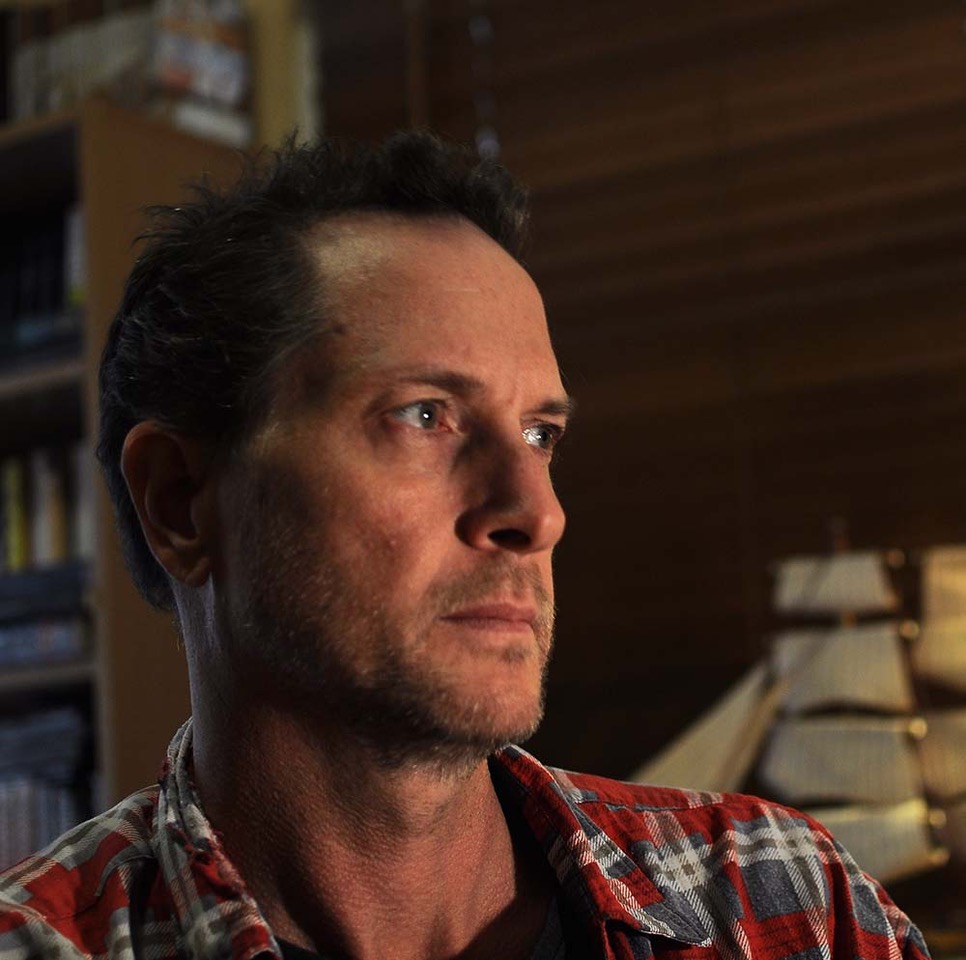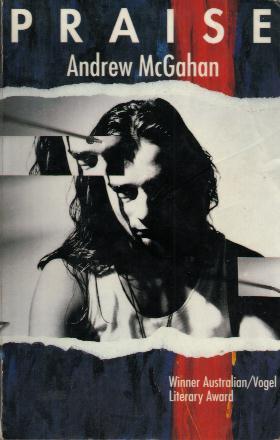When I heard of Andrew McGahan’s death last year — too young — it began a grieving process, not just for me, but for many of my writer friends. He was a rare find in Australian literature, moving from the dissolution of early beginnings in autofiction (Praise and 1988) to crime (Last Drinks), the gothic (The White Earth), satire (Underground), experimental (Wonders of a Godless World) to YA fantasy (Ship Kings series).
In all of these genres he excelled, receiving pretty much every accolade available to a local writer: the Miles Franklin, Australian Vogel, Commonwealth Writers Prize, Ned Kelly Award, a number of Aurealis awards and the Age and CBCA Books of the Year. And he was always willing to take on something new, writing also for theatre — a residency for Queensland Theatre Company produced Bait — and his screenplay for the film version of Praise won an Australian Film Institute award. It seemed there was no genre that defined or defied him.
I always had a vested interest in the Vogel award — my father was co-winner in 1982 and went on to judge the prize and I would occasionally attend the announcement dinners in my early 20s, buying and reading the books as soon as they were released, following the writers’ careers, dreaming of writing fiction one day. McGahan, too, was inspired by previous Vogel winners early on:

Andrew McGahan was at high school when his mother brought home [Tim] Winton’s An Open Swimmer. McGahan’s mother hoped this novel by the then-youthful author might inspire her son, who also wanted to become a writer. It did. From then on, recalls McGahan, ‘it was always in my head that the Vogel existed’.
— (Rosemary Neil, The Australian)
Reading McGahan’s first book, Praise, changed my life in many ways, shaping possibilities for me as a soon-to-be writer. Released in 1991, it came in the year that I was starting university, moving out of home with my boyfriend and negotiating the apathy and depression that seemed to encompass Melbourne at the time. Although Brisbane was a different city, McGahan’s characters and I still walked the dirty streets, with the same lack of vision for the future, and this was a voice I hadn’t experienced in literature up to that point. Year 12 English was full of Chekhov, Shakespeare, John Donne, the nod to Dickinson occasionally (a rare woman writer in the canon). McGahan’s prose came as quite a shock.
For starters, it was visceral. The writing was full of all those moments that usually stay hidden, especially for male characters. The bodily fluids. The itchy skin. The grime of a bathtub. The small penis (yes, this is how our hero Gordon describes it). The wanking. Oh, not again. Gordon drifts through an endless banality of not-working, often excruciating in his passivity, his inability to make a decision. And yet, somehow, the writing transcends the day to day. The term ‘grunge fiction’, applied to McGahan’s work at the time (one he dismissed), did his writing a disservice, implying a laziness and seemingly confusing the writer with his poorly motivated character; all of McGahan’s novels are constructed carefully and finely written. Even in the drudgery there is strong propulsion.

And repulsion. When reading Praise and his follow-up 1988 — which is cleverly written as a prequel to the earlier novel, setting up all kinds of unusual pre- empting dynamics between them — I often have to put the books down and turn away. His descriptions of sex, violence, occasionally a combination of the two, and the brutality of contemporary relationships, can be hard to stomach — in a good way — forcing you as a reader to confront issues you’d prefer to avoid.
I also found those two books to have an unexpected role: they were educational. In those last years pre-internet, when I was starting to experiment on my own, I just didn’t know: what it was like to take acid, or heroin; how it felt to drive a car so fast it rolled; how you could love
someone and not love them at the same time. Like Irvine Welsh’s Trainspotting, Praise was like a self-help manual for the times. McGahan’s voice became one you could trust. He seemed to have been- there done-that. All laced with a sharp tang of humour. Heroin was both highly pleasurable and completely destructive. Gordon’s world-view could accommodate all of these conflicting ideas. If anything, Gordon’s experience worked as a warning. I had no desire to try heroin or speeding on a dark highway — the writing was so compelling, I felt I already had.
I’ve focused on McGahan’s first books because they were so connected to my memories of a particular place and time. But I’ve grown up with his other novels too. With the pressure for authors to define themselves narrowly within the publishing industry, I’ve been attracted to his sudden shifts in genre, the challenges he continually poses to himself and the reader. I also appreciated that he stayed out of the limelight and wished to hide away. He immersed himself in the writing itself.
In 2014, the Sydney Morning Herald (remembered in the Allen & Unwin obituary) asked McGahan who his favourite writers were. He chose Patricia Wrightson and Charles Bukowski, an odd couple for sure, but it’s true these threads of Australian landscape and brutal style infuse all his writing. He told the Herald:
In a way, they represent the two forces— the nakedly profane and the high romantic — that have battled within my writing ever since. The profane led early on, but as I’m currently in the middle of penning a fantasy adventure series, the romantic is obviously winning of late.
*
Kirsten Krauth is an author, editor and arts journalist who lives in Castlemaine. Her bestselling novel Almost a Mirror, published in April 2020 by Transit Lounge, was shortlisted for the Penguin Literary Prize and her first novel is just_a_girl. She received the Stephen Parker Medal at the University of Canberra for Most Outstanding PhD Thesis for her creative writing PhD – Almost a Mirror – along with the Donald Horne Creative and Cultural Fellowship to produce a podcast about Australian 80s songs featured in the book.
More from Writing NSW
Check out our full range of in-person writing courses in Sydney, our online writing courses and our feedback programs to see how we can help you on your writing journey. Find out about our grants and prizes, as well as writing groups across NSW, and sign up to our weekly newsletter for writing events, opportunities and giveaways.
